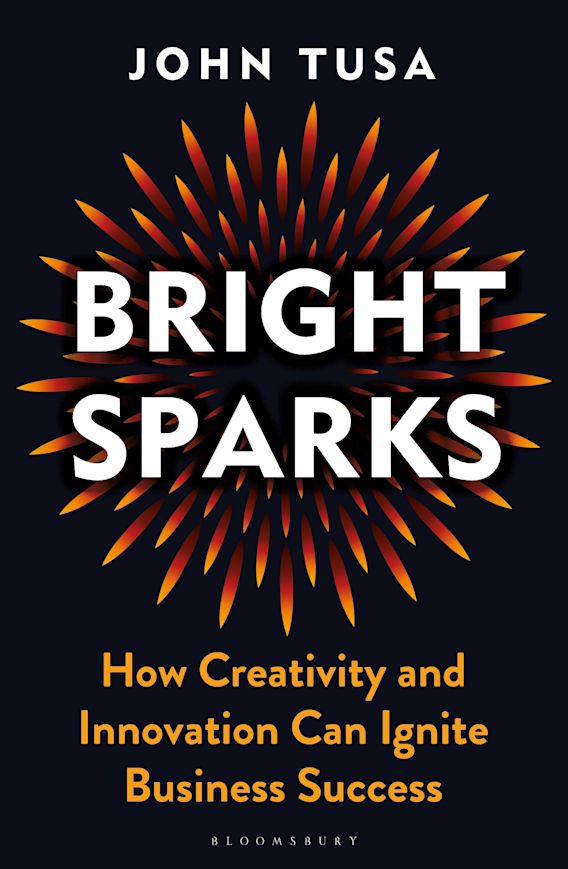Sir John Tusa’s achievements in the broadcasting and arts world are incredible – he has been the MD of the BBC World Service, he’s sat on the Boards of some of the most high profile establishments in the UK and the wider world. He was one of the first presenters on the BBC Newsnight programme, he’s written a number of books on his experiences. So, I wondered privately, what on earth was he doing writing a book on creativity? If there’s one thing the world doesn’t need, it’s another model on how to have ‘really great ideas’.
I reviewed his last book – On Board – and was hugely impressed by his storytelling approach and the rich seam of experience he can tap into. In doing so, I uncovered a story about his time at the World Service that I wanted to learn more about. This led to a second podcast with him, which included a chat about the new book. And all became clear.
Bright Sparks has a second strapline that’s not on the book cover. I feel that the publishers weighed in and added a line that would be more appealing to a professional market: “How creativity and Innovation Can Ignite Business Success”. Whoever wrote that should perhaps re-read the book. John snuck the actual sub-line in as part of the dedication: “To Bright Sparks, Who Refused to Become Damp Squibs”.
The book consists of seven stories that focus on people that have had incredible ideas and, despite the many, many hurdles put in their way, have succeeded. As you’d expect from John, the content is drawn from the arts and broadcasting world (possibly one and the same), but cover stories that hinge around the fall of the Taliban in Afghanistan, post-Communist Russia, the re-emergence of the Polish nation, the birth of what is now BBC World News (the one with 99 million weekly viewers).
It’s three books in one – examples of how powerful ideas made it to reality, a snapshot of European and Global history between 1970 – 2022 and the next instalment of John’s autobiography (unofficially, I’m being flippant with this, but put with his other books, you get a good insight into his professional life).
What do the seven stories teach us? Persistence. And lots of it. This book isn’t a structure, it’s an attitude – mapping out the qualities and flaws of the amazing people that drive through ideas. Shakespearean theatre in post-Communist Poland? No problem… it’ll just need twenty five years to happen. Television news service for a global audience? Yep, just need to poach a few million from under the Board’s nose. Each story follows the incubation of a brave, crazy or novel (often all three) idea from its first inception to a successful conclusion. Tusa doesn’t delve too deeply into the formation of the idea, instead he forensically documents how the originators pushed it through.
It’s not a book about creativity in the traditional sense. It shows lots of creative solutions and left-field thinking, but doesn’t try and turn those examples into reductive models. Thank goodness. What Tusa does is pull out the attitudes, approaches, methods and characters of those that make things happen. Often, they are people who business in general would eschew in favour of more ‘solid’ people. Which is their loss.
How can you use this book in a business perspective? Two ways: firstly, it’s inspiration, snippets, examples and stories that you can use to bring concepts to life (which I have already done – thank you John). You will love reading this book, and there are a couple of stories that unwrap like Shakespearean material themselves – not, perversely, the story about the theatre. But, blimey, does it all kick off with the World Service TV and Newsnight stories.
Secondly, this book challenges us to re-think what we see as creativity, and what we should actually be supporting and tolerating if we are to see ideas become actuality. Tusa doesn’t over-stress this, and his final summary is refreshingly short and pithy. He calls out the reluctance to support the innovators, but also, by balance, recognises they can be difficult individuals to slot into the mix.
One final observation is worth noting. The BBC takes a real pounding in this book. Several of the stories highlight what John saw as toxic bureaucracy, and the management practices that failed to support the right ideas. For those of us that grew up with the ‘Auntie Beeb” as we knew it, it’s a stark look ‘behind the curtain’. Much of this was in the late 80s through to the early 2000s, and shouldn’t be seen as a reflection of today’s organisation. And, speaking through the voyeur in me, it adds some nice spice to the book.
My experience of John’s writing is that it sits in the background of your memory and surfaces when really needed. It’s highly quotable and very memorable. In reading it, your behaviour may not instantly change, but your thinking will. And that’s very powerful.
Published by Bloomsbury Publishing
Chris Preston is a culture expert and one of the founding partners of The Culture Builders







